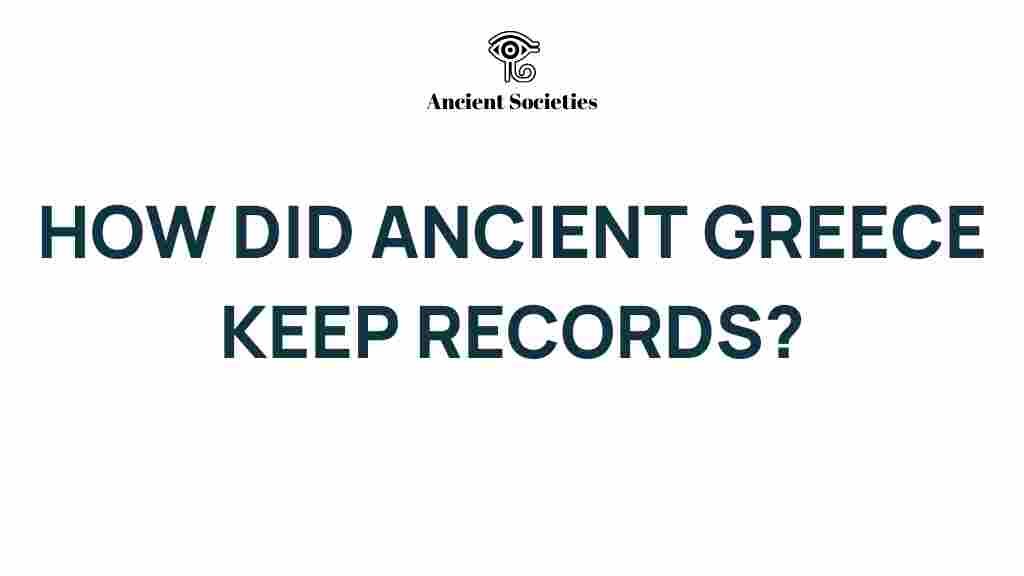Unveiling the Secrets: How Ancient Greece Preserved Knowledge
Ancient Greece is renowned for its profound influence on Western culture, philosophy, and governance. However, one aspect that often goes overlooked is how Ancient Greece excelled in record-keeping, documentation, and the preservation of knowledge. This article delves into the methods employed by the ancient Greeks to maintain their archives and how these practices contributed to their rich cultural legacy. By exploring their techniques of literacy, the use of papyrus, and various forms of inscriptions, we can gain a deeper understanding of their historic contributions.
The Importance of Record-Keeping in Ancient Greece
Record-keeping in Ancient Greece was not merely a bureaucratic necessity; it was a foundational element of their civilization. Proper documentation allowed the Greeks to:
- Preserve History: By documenting events, the Greeks ensured that their history would be remembered and studied by future generations.
- Facilitate Governance: Accurate records were essential for managing city-states, taxes, and civic duties.
- Promote Cultural Identity: Through the preservation of myths, literature, and philosophy, record-keeping helped maintain a coherent cultural identity.
Methods of Documentation in Ancient Greece
Ancient Greece utilized various methods for documentation, which are crucial for understanding their approach to record-keeping. Below are some of the primary methods they employed:
1. Use of Papyrus
Papyrus was a significant medium for writing in Ancient Greece. Made from the pith of the papyrus plant, this material was lightweight and relatively easy to produce. The Greeks used it to create scrolls for:
- Literature: Epic poems like “The Iliad” and “The Odyssey” were recorded on papyrus scrolls.
- Philosophy: Works by philosophers such as Plato and Aristotle were documented, allowing their ideas to be preserved.
- Administrative Records: City-states maintained accounts of trade, taxation, and public affairs on papyrus.
2. Inscriptions
Inscriptions were another vital form of documentation. The Greeks inscribed important texts on stone, metal, and pottery, which served several purposes:
- Public Decrees: Many city-states used inscriptions to communicate laws and public decisions, ensuring transparency.
- Commemorative Texts: Inscriptions on monuments celebrated victories, honoring gods, and notable citizens.
- Religious Records: Temples often contained inscriptions detailing rituals and offerings, preserving religious practices.
The Role of Literacy in Knowledge Preservation
Literacy in Ancient Greece was a critical factor in their ability to maintain records. The development of the Greek alphabet around the 8th century BCE played a significant role in enhancing literacy rates. The implications of this development included:
- Widespread Education: Literacy became more accessible, leading to a more informed populace.
- Literary Growth: An increase in written works, including poetry, drama, and philosophy, enriched Greek culture.
- Civic Engagement: Educated citizens were more likely to participate in governance and public life.
Step-by-Step Process of Record-Keeping in Ancient Greece
The process of record-keeping in Ancient Greece involved several steps that ensured the accuracy and longevity of documents. Understanding this process highlights the sophistication of their methods:
Step 1: Creation of Documents
Documents were created by skilled scribes who wrote on papyrus or carved inscriptions. This initial step was crucial, as the quality of the writing directly affected the document’s preservation.
Step 2: Verification
Once a document was created, it often underwent a verification process, where elders or officials would review the content for accuracy and authenticity. This step was vital for maintaining the integrity of the records.
Step 3: Storage and Archiving
Documents were stored in public archives or private collections. The Greeks recognized the importance of proper storage, utilizing clay tablets, wooden boxes, or temple repositories to protect their records from damage.
Step 4: Access and Usage
Access to these records was typically granted to citizens, scholars, and officials. Public archives served as centers of learning, where individuals could study the documents for various purposes, from legal disputes to scholarly research.
Step 5: Reproduction
To ensure the survival of essential texts, copies were often made. Scribes would reproduce important works, allowing for wider distribution and safeguarding against loss.
Troubleshooting Tips for Preserving Knowledge
While Ancient Greece had effective methods for record-keeping, challenges still arose. Here are some troubleshooting tips inspired by their practices:
- Regular Maintenance: Routinely check the condition of documents and restore or replace damaged pieces.
- Controlled Environment: Store documents in a dry, cool place to prevent deterioration.
- Digitization: In modern contexts, consider digital archiving to protect against physical decay.
The Legacy of Ancient Greek Record-Keeping
The record-keeping practices of Ancient Greece laid the groundwork for future civilizations. Their emphasis on documentation influenced the Roman Empire, which adopted many Greek methods. Today, we still recognize the value of archives and the importance of preserving our history.
Moreover, the legacy of Greek literacy and documentation continues to resonate. The preservation of philosophical works has been instrumental in shaping modern thought, while the insights gained from their historical records enhance our understanding of human civilization.
Conclusion
In summary, Ancient Greece’s approach to record-keeping was a multifaceted endeavor that played a crucial role in the preservation of knowledge. Through the use of papyrus, inscriptions, and a strong emphasis on literacy, they ensured that their culture, history, and ideas would endure through time. As we reflect on the importance of documentation in our own age, we can draw inspiration from the ancient Greeks and their commitment to preserving the knowledge that defines humanity.
For further reading on the significance of ancient documentation, you can visit this external resource. To explore more about the cultural impacts of Ancient Greece, check out our related articles here.
This article is in the category History and created by AncientSocieties Team
